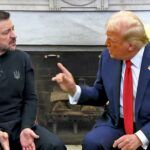What Jeff Sessions as attorney general will mean for the Iran Deal
By Aaron Arnold | December 16, 2016
Already, President-elect Donald Trump’s pick for the next US attorney general, Jeff Sessions (R-AL), has caused quite a stir over his domestic policy positions, not to mention his checkered past of making racially charged and divisive statements. Few pundits, however, have discussed what Jeff Sessions’ appointment could mean for the Iran Deal—the agreement negotiated last fall, which provides sanctions relief to Iran in exchange for limits on its nuclear program. As the country’s new top cop, Sessions will have sweeping authority to shape the Justice Department’s policies and priorities—some of which have the potential to affect relations with Iran, if indirectly.
While the attorney general does not have any big role to play directly in terms of the Iran deal, he is, however, responsible for enforcing and prosecuting key legislation that could affect the deal. Suppose, for example, that he decided to prosecute an Iranian for procuring dual-use items that are covered under the deal’s procurement channel, but does not first use the dispute resolution mechanism that is in place under the Iran deal. What kind of tension might this cause between Washington and Tehran? In fact, the Obama administration has been quite mindful of these perceptions—deciding to take a hands-off approach to pursuing new indictments that may rock the boat so far as the deal is concerned. The FBI, for example, has several cases that are essentially on hold out of fear of upending the agreement. In other words, the Justice Department’s actions can carry a ripple effect.
For example, as head of the Justice Department, the attorney general decides if and when the department should undertake investigations or prosecutions related to currently existing Iran sanctions—regarding things such as Iran’s conventional missiles, its sponsoring of terrorism, its possible human rights violations, and any other similar activities. He can also decide when to pursue asset forfeitures, and what the criminal stakes will be for violators.
Even though, strictly speaking, prosecutions in these areas do not directly relate to the deal regarding Iran’s nuclear abilities, enforcement of the laws relating generally to export controls and sanctions regarding Iran could have an impact on the deal—after all, a mullah in Tehran is not going to make a distinction between whether a US action came about because Iran violated the nuclear agreement or because Iran violated export controls in general. All he knows is that the United States—in his view—is pushing Iran around again.
What all this means is that even though the proper channels for enforcing the terms of the Iran nuclear agreement are confined to going through a commission of the seven countries involved and the International Atomic Energy Agency—with little, if any, enforcement role by the US attorney general—the political impression that would be given off by the US attorney general’s actions on any Iran-related activity would be huge. If he is heavy-handed in the Justice Department’s investigations of, say, Iran’s (non-nuclear) ballistic missiles, or its role in state-sponsored terrorism, or Iran’s suspected human rights violations, that could set a negative, downward trend for any continued implementation of the Iran nuclear agreement.
Perceptions matter. How much US law enforcement enters into the Iranian equation, though, will largely depend on Sessions’ perceptions of the nuclear agreement and his views on the enforcement of violations of the remaining sanctions against Iran—which, to reiterate, are not directly related to the nuclear deal but could affect it, nonetheless.
Throughout his campaign, Trump derided the Iran agreement as “one of the worst deals ever negotiated.” Now, Trump seems bent on filling his cabinet with members who strongly oppose it. Lt. Gen. Michael T. Flynn, whom Trump tapped to be the next national security advisor, is known for his hawkish pursuit of evidence linking Iran to the 2012 attack on the US Embassy in Benghazi. Mike Pompeo, the Republican congressman from Kansas slated to be the next CIA director, recently tweeted that he looked “forward to rolling back this disastrous deal.” Even James Mattis, a retired four-star Marine general tapped to be the next secretary of defense, views Iran as the gravest threat facing the United States.
Trump’s policy on Iran is far from certain. Ditching the Iran deal, or attempting to renegotiate, would leave the United States isolated, while the other signatories—Russia, China, France, Germany, and the United Kingdom—rush to cement financial agreements with Iran. Not only is it unlikely that the United States could negotiate a better deal, but any new sanctions are likely to be far less effective without multilateral support. Instead, experts contend that rather than “tearing up” the agreement—a Trump phrased it on the campaign trail—the Trump administration should increase pressure on Iran’s ballistic missile program with sanctions and aggressively confront any violations of the deal, formally known as the Joint Comprehensive Plan of Action, or JCPOA.
Sessions is by no means a supporter of the JCPOA. To be fair, however, he has remained somewhat quiet about the deal, compared to some of his fellow senators and new colleagues in Trump’s cabinet. Nonetheless, decisions affecting the Iran deal will be front and center for Sessions, who will enjoy considerable discretion in prioritizing and directing the Justice Department’s resources. What, then, does this mean for the JCPOA?
Sessions will need to decide how to prioritize the Justice Department’s resources to pursue proliferators and sanctions violators. When confirmed as attorney general, Sessions will get to decide who to investigate, how to investigate, and who to prosecute. For example, one of the key pieces of legislation that the Justice Department is responsible for enforcing is the International Emergency Economic Powers Act (IEEPA). Enacted in 1977 to replace parts of the Trading with the Enemy Act of 1917, IEEPA gives the president a broad set of tools to investigate, regulate, or prohibit foreign transactions that may pose an “unusual and extraordinary threat” to US national security. Both Presidents Bush and Obama have extensively used this authority to impose sanctions and blocking orders against Iran, North Korea, Burma, Iraq, Libya, and Russia, among others.
In addition to giving the president the authority to regulate aspects of trade and commerce, IEEPA also spells out both criminal and civil penalties for violations. Between the year 2000 and July of 2016, the Justice Department pursued approximately 293 IEEPA criminal violations. The cases ranged from export and sanctions violations to terrorist financing. Most recently, for example, the Justice Department indicted four Turkish nationals for violating US sanctions against Iran. According to the indictment, the four co-conspirators intentionally used the US financial system to “conduct hundreds of millions of dollars’ worth of transactions on behalf of the Government of Iran and other Iranian entities” between 2014 and 2016.
In recent years, however, the department has been somewhat inconsistent when it comes to investigating and prosecuting IEEPA violations. In fact, during the nuclear negotiations with Iran, and in the months thereafter, the Obama administration took a decidedly cautious approach to seeking criminal charges against Iranian procurement agents and sanctions violators. Take, for example, the case against Iranian national Syed Abolfazl Shahab Jamili. In 2013 the Justice Department indicted—in absentia—Jamili for procuring thousands of export-controlled pressure transducers for Iran (dual-use parts with nuclear applications). As nuclear negotiations wound to a close in 2015, Obama’s Justice Department dropped the charges against Jamili, along with others accused of sanctions violations, as part of a prisoner swap with Iran. Jamili’s co-conspirator, Alex Cheng, was not so lucky. Cheng received a nine-year sentence for his role in facilitating the transshipment of nuclear dual-use goods to Iran—one of the longest sentences to-date for IEEPA violations.
This kid-glove handling seems to be more than a coincidence, as Andrea Stricker, a senior policy analyst with the Institute for Science and International Security, recently learned. Based on interviews with US government officials from three independent agencies, Stricker found that US enforcement agencies were hesitant to seek extradition requests or conduct lure operations (the term for the strategy of convincing unsuspecting violators to travel to jurisdictions friendly to the United States) “for fear of negatively affecting the negotiations of the Joint Comprehensive Plan of Action.” While this may have helped push the deal over the final hurdles, the politicization of criminal law does not necessarily set a good precedent for the next attorney general.
The value of discretion. But if the Obama administration can be accused of reining in its attorney general in order to give the Iran nuclear deal a chance, then the incoming Trump administration must be wary of going too far in the other direction. Sessions’ approach will depend on his relationship with the White House. On one hand, some have characterized Trump as a micro-manager, while others have said that he is taking a “bottom-up” approach. A strong, empowered attorney general may be quite aggressive when pursuing IEEPA or other types of export violations, which may have diplomatic consequences with Tehran. And the last thing that this part of the world needs is a bull in the china shop, when it comes to the Justice Department pursuing criminal violations against any unsatisfactory, non-nuclear behavior by Iran.
To be clear, by no means am I suggesting that the next attorney general should turn a blind eye to violations of US criminal law when it comes to sanctions or export violations. Nonetheless, Sessions must be cautious when using the tools available to him and cognizant of the costs they potentially pose for diplomatic relations. One of the strongest legal weapons Sessions will have available to him, for example, is the ability to seize assets held in overseas accounts by sanctions violators; this power derives from what is known as the 981(k) statute, named after the corresponding section of the USA Patriot Act. Under this rule, the attorney general can seize assets that are not technically held in US bank accounts. So far, the United States has taken a relatively cautious approach to using this legal statute against sanctions violators and proliferations violations, instead, primarily reserving its use against terrorist financiers.
To date, the Justice Department has deployed this tool against only one proliferator—Li Fangwei, a Chinese national who has been charged with providing dual-use materials to Iran’s nuclear and ballistic missile program. Using 981(k), the Justice Department seized almost $7 million of Li’s assets. Although powerful, this form of asset forfeiture does not come without consequences. Because these methods depend on leveraging the role of the US financial system in international banking, overuse can potentially damage business relationships and the international standing for US banks—an ironic twist for a billionaire President-elect who ran a good deal of his campaign by touting his ability to get better business deals with foreign powers.
Enforcing IEEPA violations may also present technical challenges for Sessions and his department. Not only might Tehran view aggressive enforcement of non-nuclear sanctions violations as a violation of the spirit of the nuclear agreement, but it could also reprimand the United States for not using the agreement’s dispute resolution mechanism. According to the Iran Deal, any member of the agreement can bring a dispute to the Joint Commission, which then has 15 days to resolve the dispute. If not resolved by that time, the matter is referred to the Ministers of Foreign Affairs and then the UN Security Council for a vote on continuing sanctions. Depending on how the Justice Department prosecutes IEEPA violations, Iran could claim that the United States is not upholding its commitment to lift sanctions.
Or to phrase it another way: If Sessions’ Justice Department aggressively pursues violations of non-nuclear sanctions, export controls, or other criminal violations against Iranian entities, Tehran may claim foul. Suppose, for example, that the FBI is free to move forward its cases that have been on hold since the negotiations. If the United States does not first use the dispute resolution mechanism, Tehran may view Washington as acting in bad faith.
And on the other hand, doing nothing is likely to be an unpopular decision in a Trump administration.
Despite these challenges, however, Sessions should seize the opportunity to reinvigorate the United States’ approach to enforcing supply-side controls altogether. Tougher penalties for IEEPA violations, for example, could send a strong signal to Iran, China, and North Korea. This will require not only that the Justice Department be more proactive in terms of its investigations, but also seek innovative approaches to prosecution, like those used against proliferator Li Fangwei. As such, the job of the attorney general calls for a sense of delicacy, judgment, and nuance when it comes to the details of the Iran Deal, as well as a sense of when to bring out the big guns of asset seizure if a violation has occurred. We will soon see if the nation’s new top cop has those qualities.
Together, we make the world safer.
The Bulletin elevates expert voices above the noise. But as an independent nonprofit organization, our operations depend on the support of readers like you. Help us continue to deliver quality journalism that holds leaders accountable. Your support of our work at any level is important. In return, we promise our coverage will be understandable, influential, vigilant, solution-oriented, and fair-minded. Together we can make a difference.
Topics: Analysis, Special Topics, Technology and Security















